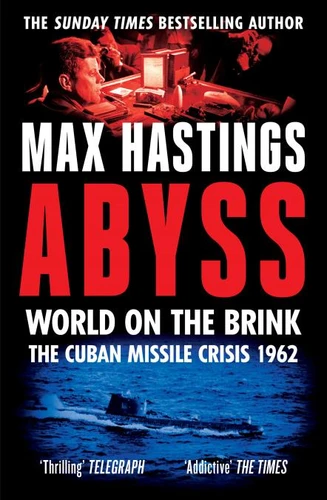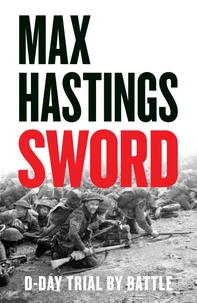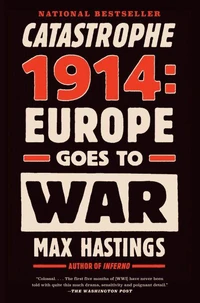Abyss. The Cuban Missile Crisis 1962
Par :Formats :
Disponible dans votre compte client Decitre ou Furet du Nord dès validation de votre commande. Le format ePub protégé est :
- Compatible avec une lecture sur My Vivlio (smartphone, tablette, ordinateur)
- Compatible avec une lecture sur liseuses Vivlio
- Pour les liseuses autres que Vivlio, vous devez utiliser le logiciel Adobe Digital Edition. Non compatible avec la lecture sur les liseuses Kindle, Remarkable et Sony
- Non compatible avec un achat hors France métropolitaine
 , qui est-ce ?
, qui est-ce ?Notre partenaire de plateforme de lecture numérique où vous retrouverez l'ensemble de vos ebooks gratuitement
Pour en savoir plus sur nos ebooks, consultez notre aide en ligne ici
- Nombre de pages576
- FormatePub
- ISBN978-0-00-836501-1
- EAN9780008365011
- Date de parution29/09/2022
- Protection num.Adobe DRM
- Infos supplémentairesepub
- ÉditeurWilliam Collins
Résumé
A Times History Book of the Year 2022
From the #1 bestselling historian Max Hastings 'the heart-stopping story of the missile crisis' Daily Telegraph
The 1962 Cuban Missile Crisis was the most perilous event in history, when mankind faced a looming nuclear collision between the United States and Soviet Union. During those weeks, the world gazed into the abyss of potential annihilation.
Max Hastings's graphic new history tells the story from the viewpoints of national leaders, Russian officers, Cuban peasants, American pilots and British disarmers.
Max Hastings deploys his accustomed blend of eye-witness interviews, archive documents and diaries, White House tape recordings, top-down analysis, first to paint word-portraits of the Cold War experiences of Fidel Castro's Cuba, Nikita Khrushchev's Russia and Kennedy's America; then to describe the nail-biting Thirteen Days in which Armageddon beckoned. Hastings began researching this book believing that he was exploring a past event from twentieth century history.
He is as shocked as are millions of us around the world, to discover that the rape of Ukraine gives this narrative a hitherto unimaginable twenty-first century immediacy. We may be witnessing the onset of a new Cold War between nuclear-armed superpowers. To contend with today's threat, which Hastings fears will prove enduring, it is critical to understand how, sixty years ago, the world survived its last glimpse into the abyss.
Only by fearing the worst, he argues, can our leaders hope to secure the survival of the planet.
Max Hastings deploys his accustomed blend of eye-witness interviews, archive documents and diaries, White House tape recordings, top-down analysis, first to paint word-portraits of the Cold War experiences of Fidel Castro's Cuba, Nikita Khrushchev's Russia and Kennedy's America; then to describe the nail-biting Thirteen Days in which Armageddon beckoned. Hastings began researching this book believing that he was exploring a past event from twentieth century history.
He is as shocked as are millions of us around the world, to discover that the rape of Ukraine gives this narrative a hitherto unimaginable twenty-first century immediacy. We may be witnessing the onset of a new Cold War between nuclear-armed superpowers. To contend with today's threat, which Hastings fears will prove enduring, it is critical to understand how, sixty years ago, the world survived its last glimpse into the abyss.
Only by fearing the worst, he argues, can our leaders hope to secure the survival of the planet.
A Times History Book of the Year 2022
From the #1 bestselling historian Max Hastings 'the heart-stopping story of the missile crisis' Daily Telegraph
The 1962 Cuban Missile Crisis was the most perilous event in history, when mankind faced a looming nuclear collision between the United States and Soviet Union. During those weeks, the world gazed into the abyss of potential annihilation.
Max Hastings's graphic new history tells the story from the viewpoints of national leaders, Russian officers, Cuban peasants, American pilots and British disarmers.
Max Hastings deploys his accustomed blend of eye-witness interviews, archive documents and diaries, White House tape recordings, top-down analysis, first to paint word-portraits of the Cold War experiences of Fidel Castro's Cuba, Nikita Khrushchev's Russia and Kennedy's America; then to describe the nail-biting Thirteen Days in which Armageddon beckoned. Hastings began researching this book believing that he was exploring a past event from twentieth century history.
He is as shocked as are millions of us around the world, to discover that the rape of Ukraine gives this narrative a hitherto unimaginable twenty-first century immediacy. We may be witnessing the onset of a new Cold War between nuclear-armed superpowers. To contend with today's threat, which Hastings fears will prove enduring, it is critical to understand how, sixty years ago, the world survived its last glimpse into the abyss.
Only by fearing the worst, he argues, can our leaders hope to secure the survival of the planet.
Max Hastings deploys his accustomed blend of eye-witness interviews, archive documents and diaries, White House tape recordings, top-down analysis, first to paint word-portraits of the Cold War experiences of Fidel Castro's Cuba, Nikita Khrushchev's Russia and Kennedy's America; then to describe the nail-biting Thirteen Days in which Armageddon beckoned. Hastings began researching this book believing that he was exploring a past event from twentieth century history.
He is as shocked as are millions of us around the world, to discover that the rape of Ukraine gives this narrative a hitherto unimaginable twenty-first century immediacy. We may be witnessing the onset of a new Cold War between nuclear-armed superpowers. To contend with today's threat, which Hastings fears will prove enduring, it is critical to understand how, sixty years ago, the world survived its last glimpse into the abyss.
Only by fearing the worst, he argues, can our leaders hope to secure the survival of the planet.






















